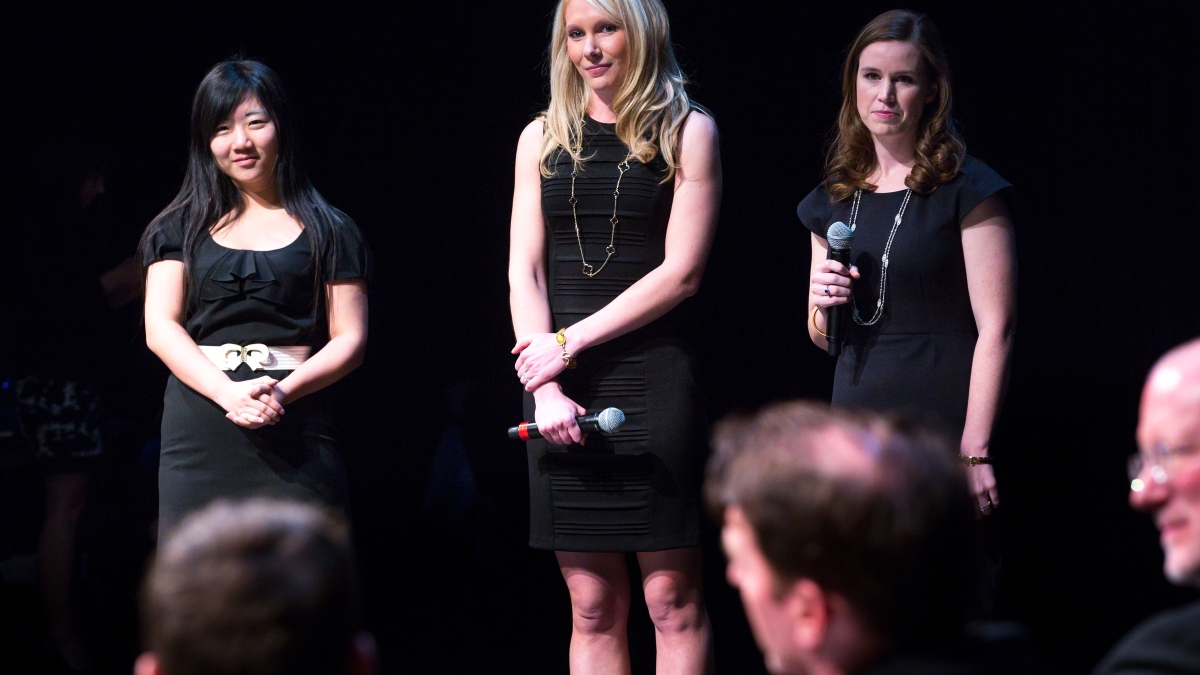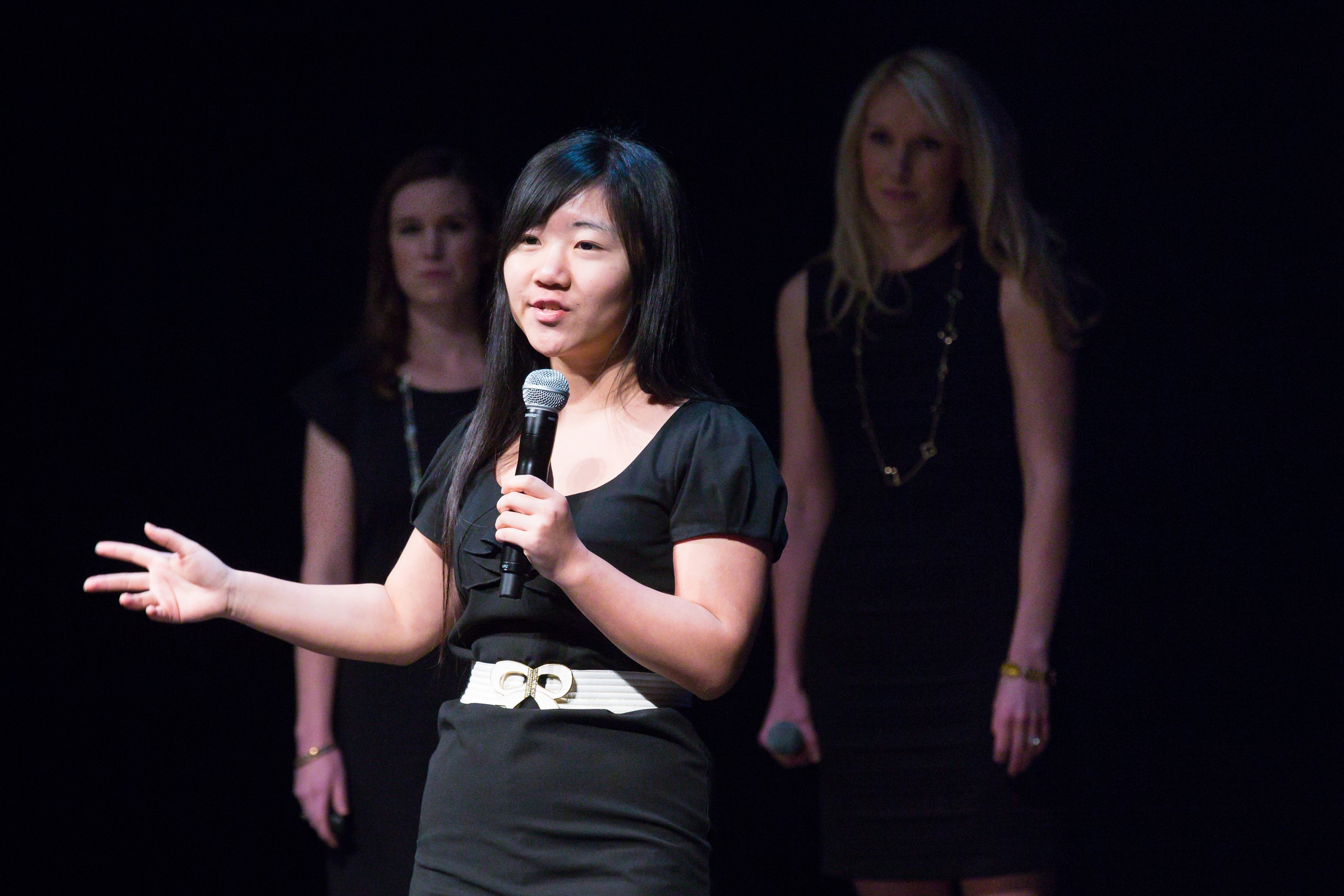Editor's note: This story is being highlighted in ASU Now's year in review. To read more top stories from 2016, click here.
Despite studying English every year since kindergarten, Chang Liu realized upon arriving in Arizona last August that she could not properly speak the language.
“When I came here, just to get out of the airport, I didn’t know how to tell the driver that I’m going to the ASU Tempe campus,” said Liu, who came from China to study marketing at Arizona State University.
“It was a total shock.”
The difficulties continued on campus, where Liu said she had issues understanding her professors.
It wasn't until she started attending conversation groupsIn the conversation groups, international students at ASU meet with Americans to talk about food, college life and other topics in order to build fluency. held by her college, the W. P. Carey School of Business, that she realized something which wasn't emphasized during her many years of English classes: The only way to really grasp another language is to practice with a native speaker.
And that’s when inspiration struck: Liu needed to create a mobile application that would connect people in China, eager to practice English, with native speakers here in America.
And it could become a sustainable business.
Liu’s idea started to coalesce, and last fall, she applied to the Sun Devil Igniter Challenge, a competition sponsored by the Center for Entrepreneurship at W. P. Carey. The Igniter board of directors loved the idea of the LetsChat mobile app and introduced Liu to Megan Kirk and Elizabeth Oviedo, both MBA students at W. P. Carey.
“They recognized that Chang was strong on the product and vision side, but they thought LetsChat needed some business experience, so they connected us and we decided to team up,” Oviedo said.
Chang Liu realized when she came to ASU that the best way to learn English is to converse with a native speaker. Photo by Charlie Leight/ASU Now
The three quickly got to work creating a business plan that included marketing and a revenue model, as well as product development. They hired Ramprasad Kateel, a graduate student in information management, to do the technical development.
In November, LetsChat was named one of three finalist teams in the Igniter Challenge, which came with $7,500 in funding to accelerate their project.
The work was intense. Even when the three women were scattered among different time zones over winter break, they held Google Hangouts several times a week to keep going.
Liu worked closely with Kateel to add all the features she wanted in the app. Time constraints meant that not everything could be accomplished. But LetsChat was coming together.
“I was so excited. It was like a baby and seeing him or her grow up,” Liu said.
The three women worked on the project while honing their presentation and attending classes. Kirk also was working a corporate job, which she is now leaving.
“There have been hard moments, and it’s certainly a balancing act,” said Kirk, who credited regular meetings with the Igniter board for keeping the team on track.
The work paid off. LetsChat won the Igniter Challenge — and the $50,000 grand prize — at the Spark TankThe other finalist teams were Sential, which created an automated chest-compression device, and Dropspot, a team of freshmen who developed a new social-media app and won a $10,000 runner-up prize. competition Feb. 4.
Entrepreneur Les BrunLes Brun is chairman and CEO of Sarr Group. He founded and is chairman emeritus of Hamilton Lane private equity advisory and management firm. said that he and the other judges selected LetsChat because it had the best chance for succeeding as a business.
“These guys did a spectacular job. This was a professional-level, tech entrepreneur presentation that rocked our world,” Brun said.
How it works
The LetsChat prototype is expected to be done by later this year. Because most people in Asia use Android phones, that will be the first platform. An iPhone version will come later.
LetsChat will recruit a pool of native English speakers, who will upload video profiles to the app.
People in China and, eventually, other Asian countries will be able to download the app, choose a native English speaker by their profile or by an interest tag, such as “Star Wars” or “sports,” and begin a conversation.
Users will pay $15 an hour to communicate one-on-one with an English speaker via video, voice or text messaging, or $5 an hour for a group chat. LetsChat will take a 20 percent commission, and the English speaker will keep the rest.
The team estimates that English speakers can earn $4,400 a year by chatting seven hours a week, and they can work whenever they want, Uber-style.
By the app's third year, the LetsChat team predicts revenues of $8.5 million.
The platform will differ from its competitors because it will focus on one-on-one or group conversations and include a translation function when a user doesn’t understand a word.
Among the biggest successes so far is the LetsChat partnership with the TESOLTESOL stands for Teachers of English to Speakers of Other Languages. program in ASU’s English DepartmentThe English Department is part of the College of Liberal Arts and Sciences.. TESOL students must accrue 150 hours of teaching internship work, and the program has approved LetsChat as one way for the interns to get their hours.
ASU's Global Launch Intensive English program has offered to connect the team with international students who plan to come to American universities to study.
In August, the women will travel to several universities in China to drum up interest in the app by visiting English-learning clubs. From talking with friends back in China, Liu expects it to be a popular tool.
“They’re very curious and want to communicate with people here. Some of them asked me to introduce American friends to them,” she said.
“English is necessary if you want a better job or to go to a better education in China. If you can speak English you can get a higher salary.”
Top photo: The LetsChat team — (from left) Chang Liu, Megan Kirk and Elizabeth Oviedo — presents its idea for a new mobile application during the Spark Tank competition on Feb. 4. The team won the $50,000 Igniter Challenge prize. Photo by Charlie Leight/ASU Now
More Science and technology

Breakthrough copper alloy achieves unprecedented high-temperature performance
A team of researchers from Arizona State University, the U.S. Army Research Laboratory, Lehigh University and Louisiana State University has developed a groundbreaking high-temperature copper alloy…

4 ASU researchers named senior members of the National Academy of Inventors
The National Academy of Inventors recently named four Arizona State University researchers as senior members to the prestigious organization.Professor Qiang Chen and associate professors Matthew…

Transforming Arizona’s highways for a smoother drive
Imagine you’re driving down a smooth stretch of road. Your tires have firm traction. There are no potholes you need to swerve to avoid. Your suspension feels responsive. You’re relaxed and focused on…



